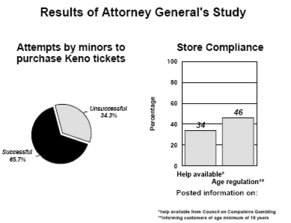From April to September, 1996, the Massachusetts Attorney General’s Consumer Protection and Antitrust Division undertook a statewide study of illegal sales of Keno tickets to underage youth. Keno is a game of chance similar to a lottery in which The Lottery randomly selects 20 out of 80 numbers of which players can play up to 12 numbers in an attempt to match as many as possible. In Massachusetts, the sale of Keno tickets is limited to licensed agents, who can sell tickets legally only to individuals who are at least eighteen years old. The sales agents are located in convenience stores, smoke shops, bowladromes, restaurants, and bars. Fourteen children (with parental consent) volunteered to participate in the study by attempting to purchase Keno tickets in stores licensed as sales agents. In addition, the children recorded whether two types of information was posted conspicuously in each location: (1) information about help available from the Council on Compulsive Gambling, and (2) notices informing customers about the legal age minimum of 18. The study found that the children were able to place Keno bets successfully 66% (109/166) of the time. The youngest child who was able to purchase a ticket was 14 years old. In addition, although sales agents are mandated legally to post both types of information, only 34% of the sales agents posted information about help available, while 46% posted information about minimum age requirements. The Attorney General supports educating sales agents to encourage voluntary compliance with legal requirements prohibiting sales to minors. In addition, civil penalties of up to $5,000 per violation are a possible means of compelling compliance.
Source: Harshbarger, S. (October, 1996). Kids and Keno are a bad bet: A report on the sale of Keno tickets to minors in Massachusetts. Boston, MA: Attorney General’s Office, Commonwealth of Massachusetts.
This public education project is funded, in part, by The Andrews Foundation.
This fax may be copied without permission. Please cite The WAGER as the source.
For more information contact the Massachusetts Council on Compulsive Gambling,
190 High Street, Suite 6, Boston, MA 02110.





